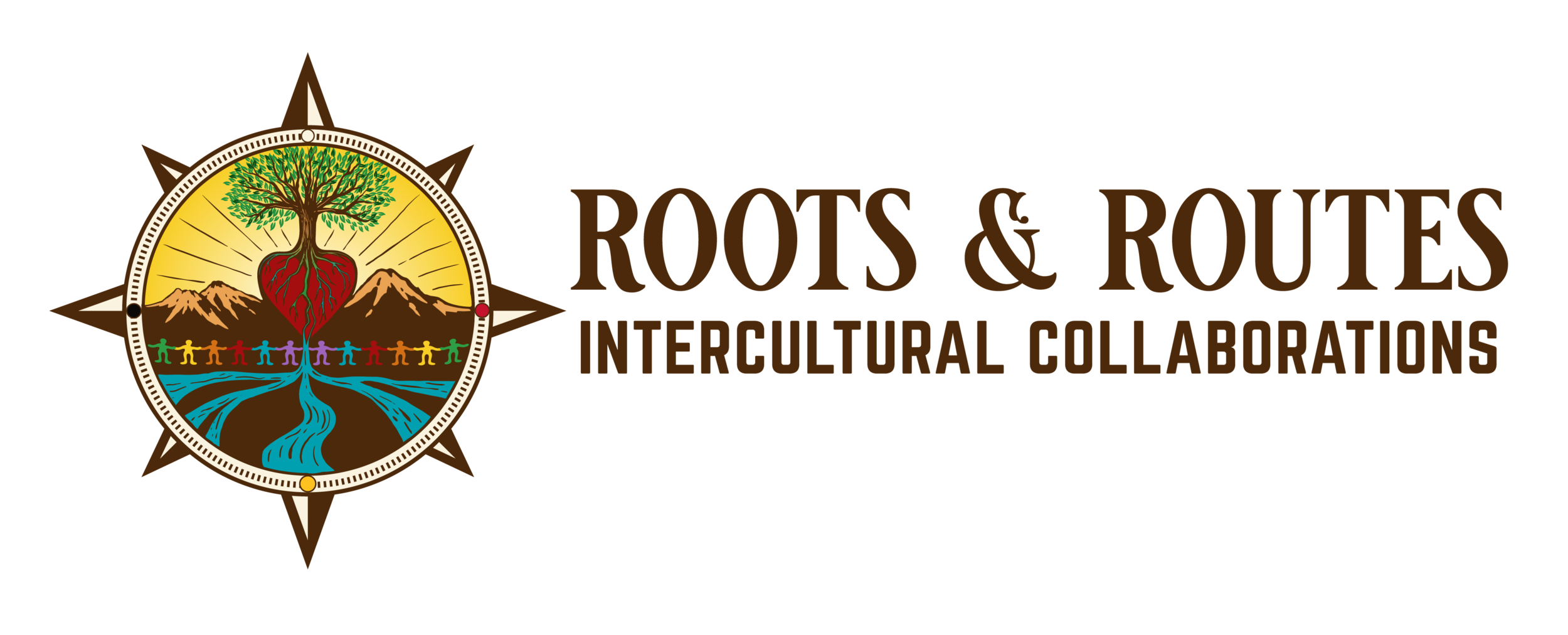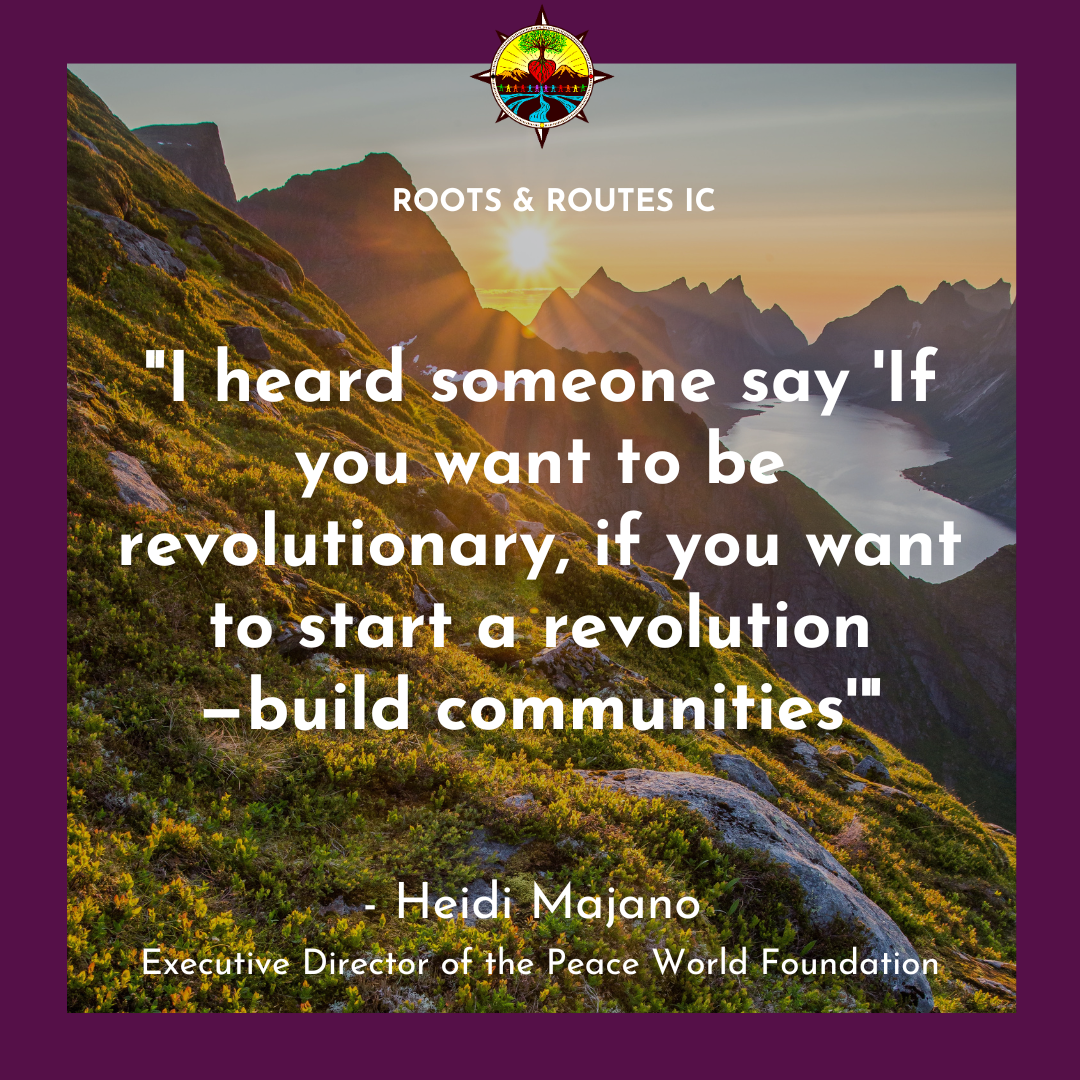Heidi & Juli: The Impacts of Nonprofits and Forming Communities
“Being a nonprofit is a very vast field, and how we want to do it is a strategic decision each and every day, each and every moment, and so it’s very tricky.”
Juli Hazlewood, Co-founder & Executive Director of Roots & Routes
On the 23rd of October, 2022, the Youth Visionary Collective (YVC) at Roots & Routes IC attended the final meeting of a four-part series with guest speakers Heidi Majano, E.D. of the Peaceful World Foundation and Juli Hazlewood, E.D. at Roots & Routes. In the previous meeting that took place this past summer, the group discussed their journeys to graduate school, and how we can decolonize higher education. Both Heidi and Juli’s words left the YVC feeling inspired, allowing for members to reflect on and rethink their own perspectives on development.
In this fourth segment, the two shared their journeys post-grad and what it was like for each of them to enter the nonprofit world. Both of them had unique stories to tell about the journey that brought them to where they are today, and despite their journeys being drastically different they undeniably shared formative experiences.
Heidi fondly recounts her memories of working at the Red Victorian in San Francisco as the gateway into her career within the nonprofit sector. This opportunity, however, was not easily handed to Heidi as a young woman. This was a transitional period, between balancing motherhood and moving across the country, and Heidi did not know the details of her future, but what she did know was her ambition and drive. Heidi took initiative by walking up to the Red Victorian, a historic hotel on Haight Street in San Francisco, with her CV in her hands and introduced herself in search of a hiring position.
Soon after she earned a job at the front desk, Heidi explained, “[They] quickly saw my skills and put me as an operational manager and then I got a salary, health benefits, and moving my way forward with this passion that I had around peace-building”. When starting at the front desk position at the time Heidi did not expect it to bring her to where she is today, but through dedication and listening to her heart, she found her craft. Today, Heidi continues to find fulfillment in her career as the Executive Director of the Peaceful World Foundation, which was established by Sami Sunchild, the owner of the Red Victorian.
The Red Victorian—the hotel that started Heidi’s journey to become the E.D. of the Peaceful World Foundation. Photo by Bernard Gagnon.
Fresh out of postgrad Juli, too, was faced with navigating her next step in life. When reciting the series of events that happened after her graduation there was a pivotal moment, a realization that she needed to pursue her passion. After earning her degree Juli remembers applying for various jobs, one of which was a last-minute submission for a teaching position at an Irish university. She ended up receiving the job, so she packed her belongings to move across the world from Santa Cruz to Dublin where she would relocate herself and start the next chapter of her story.
A few weeks in, everything changed for Juli when she got in a bicycle accident, causing her to spend a couple of weeks in the hospital. This time provided her space for introspection, where she reassessed her life and questioned why she had ended up working in academia. During these reflective moments, Juli went back to her roots and inner calling, a dream she had been holding onto for nearly fifteen years. A vision that originated in 1997, where she imagined working with Indigenous peoples and leaders to facilitate an environment where these communities could teach each other and youth from around the world. An inspiring story that at first seemed like a tragic accident turned into the blossoming of what we have today, Roots and Routes. Juli recounted this experience:
“I was in the hospital for two weeks, and while I was in the hospital I was like ‘What the what am I doing here’, you know, I am like ‘What am I doing here in Ireland and what am I doing here in academia?’”
Both Hiedi and Juli’s journeys were uniquely their own while having something in common—they both followed their heart. For Heidi and Juli, their calling was within social and environmental justice and entering the nonprofit field. Figuring out which field to enter and what might be right for you can be difficult, as can understanding what the different fields entail. For Juli, she initially had trouble understanding what a nonprofit really was. She explained to us that she grew up in the agricultural state of Indiana, USA, where nonprofits were referred to as charity, and a focus on social justice or systemic changes was lacking. It wasn’t until she went to Ecuador that it became more clear what a nonprofit could do.
During her first visit to Ecuador, Juli worked with a governmental organization focusing on sustainable development, which is how she was introduced to the Chocó rainforest and the Indigenous Chachi community where the idea of Roots & Routes IC originated. After this position wrapped up, Juli wanted to continue working with the Chachis and found the non-governmental organization (NGO) Altropico, which works closely with the Afro-descendent and Indigenous communities of the Chocó rainforest. Through working with Altropico she started understanding the inner workings of the nonprofit world as they were an Ecuador-based organization with connections to international foundations and aid.
Juli with Indigenous Chachi youth in the Chocó Rainforest.
It can be difficult, however, to understand the difference between a nonprofit and an NGO. Juli explained that the system varies between the Global North and the Global South. What is known as a nonprofit in the United States is called an NGO in Ecuador and many other parts of the world. Juli states “that whole way of understanding whether a corporation is making profit or not is a pertinent way of categorization in the Global North.” In the Global North, they are corporations choosing not to prioritize profit, and in the Global South, they are a sector that is separate from the government and dependent on foreign entities and monies.
Technically, a nonprofit is registered as a corporation, an economic body, that puts all money generated back into growing the organization itself. Nonprofits further a certain social cause or a shared goal—what is called a “mission.” Nonprofits were actually created as a vehicle for tax evasion, and the rich getting richer, by elite families like the Rockefellers. Read more in the book, The Revolution will not be Funded: Beyond the Non-profit Industrial Complex.
Having understood this, Juli tried to figure out how many organizations were able to have “some sort of impact within the country of Ecuador, but also within the United States and around the world”. She wanted to know “How could we set up something that would have a similar type of impact in relation to the Choco rainforest, but instead of being run by people from the United States or Quito, how could we set up an organization in ways that the same people from the rainforest were the decision makers about how the organization would run, and also be teachers within the programs we would set up?” These different variables led to the decision to create a nonprofit, despite being far from the perfect option. Watch Juli explain how the Chachis inspired her initial ideas for starting Roots & Routes in the following video:
Despite being flawed, nonprofits can have a great impact, both systemically and personally. Heidi explained to the YVC the influence her nonprofit work has had on her own life. She described how her experiences with international organizations has taught her the importance of community and invaluable skills such as community development, having a clear vision of what you want to achieve, and recognizing the importance of strong teamwork.
One thing nonprofits such as the Peaceful World Foundation and Roots & Routes IC do well is their focus on community building. Heidi explained to the YVC how important communities are to our survival as human beings. Heidi’s experience working with rural communities in Papua New Guinea for ten years prior to joining the Peaceful World Foundation taught her just how valuable community development is. She explained how important nonprofits can be in this video:
What Heidi took away from the communities she worked with in Papua New Guinea was the value of sharing and being with others. She took the harvest as an example and explained that “there was no ‘you owe me this, I owe you this, it’s bountiful. To see people share their bountiful produce from their garden, that was really heartwarming. You know, we’re so used to ‘What do I give you for this?’ [Instead it was] ‘Oh no no no, this is yours.’ That feeling of not feeling like you owe someone something, that’s what I take.” She described the importance of communities to us at the YVC:
During the pandemic, many of us lost connection to our communities and became very isolated, something which has been happening to Indigenous peoples for a long time as they are displaced and disconnected from their traditional lands and communities. Heidi described how the pandemic highlighted the value of communities, and that this understanding should not be taken lightly:
“Community is part of our survival, and what was really interesting during the pandemic and everyone isolating is that we’re not meant to be in silos, we’re not meant to have that sort of lifestyle, and I think more and more our Indigenous ancestors they know this, they know that we’re supposed to be together in community. I think the social experiment that took place during the pandemic, and all the medical stuff that’s coming out of how it impacts our mental health and our wellbeing—it’s not to be taken lightly”
In the end, no matter what your journey looks like, what we can take away from Heidi & Juli’s stories is that it is what is in your heart, the impact you are able to create, and that you are happy with where you end up, that matters. Throughout the conversations it became apparent that there is no cookie-cutter method to life and starting your career after school, but it is certain that with passion and commitment you are bound to find your calling. What has your journey looked like?





